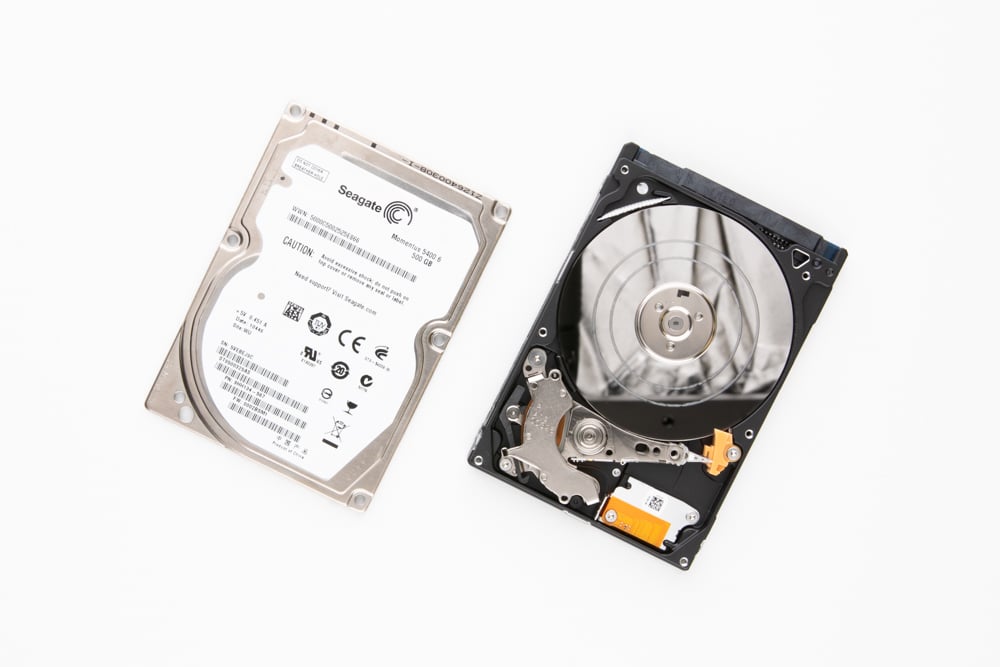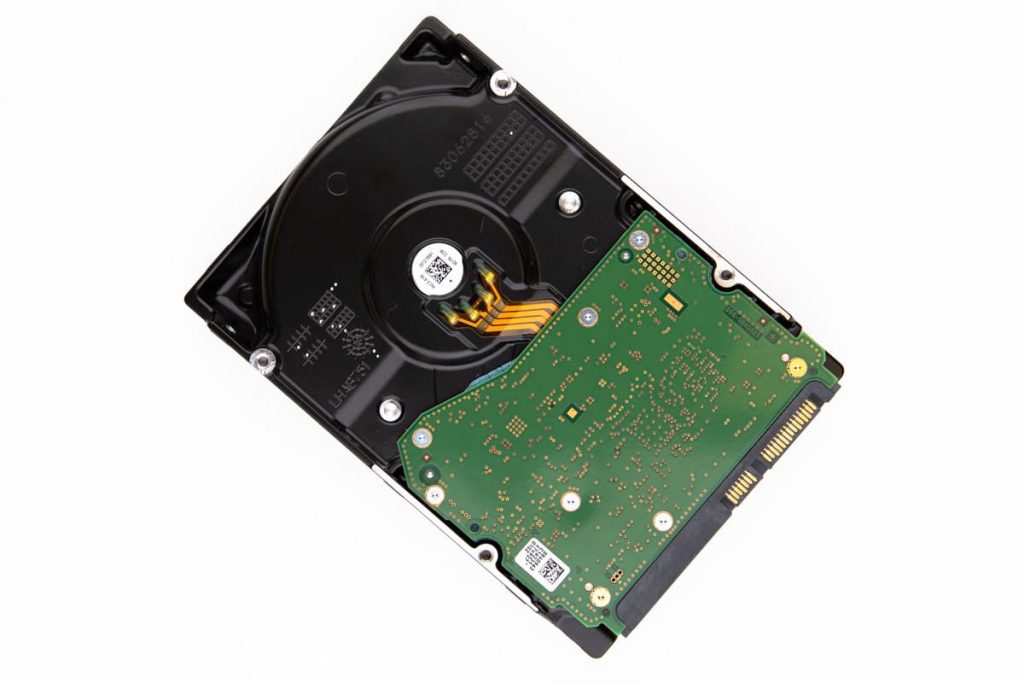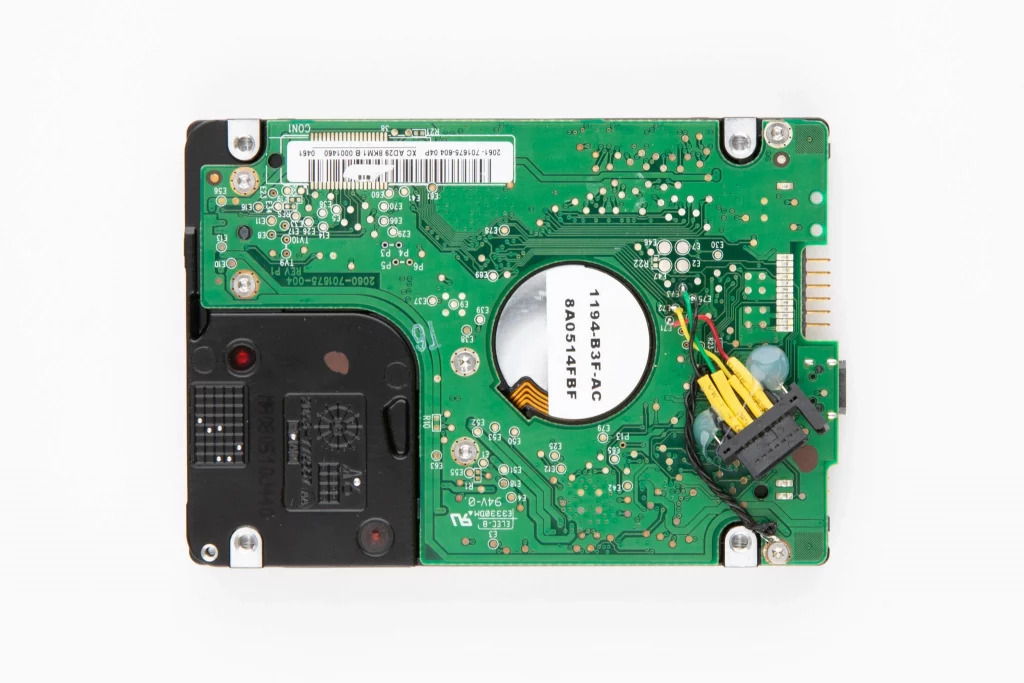Hard drive failure can often be rectified by trying a few troubleshooting steps, like checking cables, trying a different port, or running a diagnostic tool. Unfortunately, hard drive failures can occur unexpectedly, causing panic and potential loss of important files.
Understanding the causes, consequences, and effective solutions for hard drive failure is vital for safeguarding your data and ensuring a swift recovery. This comprehensive article will examine the causes of hard drive failure, examine the potential consequences, and outline the recommended steps to address the issue, emphasizing the importance of utilizing professional data recovery services.
Causes of Hard Drive Failure
Physical Damage. Physical factors such as impact, overheating, power surges, or water damage can lead to hard drive failure. These incidents can cause severe mechanical damage to the delicate internal components, rendering the drive inoperable.
Hard drives consist of sensitive, intricate moving parts that can degrade over time. Continuous usage, exposure to dust, and improper handling can contribute to mechanical failures, such as motor breakdowns, spindle issues, or damaged read/write heads. Any of these problems can result in a non-responsive drive.

Logical Errors. Logical errors can occur due to various software-related issues. File system corruption, malware attacks, improper shutdowns, or conflicts between software and hardware can all lead to data loss or cause the drive to malfunction. These errors typically make data inaccessible or prevent the drive from functioning correctly.
Firmware Corruption. A hard drive’s firmware plays a crucial role in its proper functioning. If the firmware becomes corrupt or outdated, it can lead to various problems, including failure to boot or the drive needing to be recognized by the system. Software conflicts, malware, or faulty firmware updates can cause firmware corruption.
Consequences of Hard Drive Failure
Hard drive failure can result in significant consequences such as data loss, work downtime, and financial implications. It is crucial to have proper measures to prevent and mitigate the risks associated with hard drive failure.
Data Loss
The most significant consequence of hard drive failure is the potential loss of invaluable data. This can include personal documents, cherished photos, important videos, critical business files, and much more. The emotional and financial impact of data loss can be devastating, making data recovery a top priority.
Work Downtime
Hard drive failure can result in extended periods of downtime, particularly for businesses heavily reliant on digital infrastructure. This downtime can disrupt daily operations, leading to decreased productivity, missed deadlines, dissatisfied customers, and even lost opportunities. Minimizing downtime through swift resolution is essential.
Financial Implications
Depending on the extent of data loss and the value of the affected files, recovering from a hard drive failure can be a costly affair. Businesses may incur expenses associated with data recovery services and hardware replacement. Moreover, the financial toll of lost productivity and missed business opportunities can be substantial.
Ways to Fix HDD Failure
Several methods exist to fix Hard Disk Drive (HDD) failures that vary in complexity and severity of the issue. Let’s delve into some viable solutions that you can try before seeking professional help.
- Identify the Issue. When experiencing symptoms of hard drive failure, such as strange noises, frequent crashes, or the inability to access files, it is crucial to stop using the drive immediately to prevent further damage. Note any error messages or unusual behavior to provide important information to the data recovery professionals.
- Consult Professionals. It is advisable to seek professional assistance to maximize the chances of successful data recovery and minimize the risk of permanent data loss. Data recovery service providers possess the expertise, specialized tools, and controlled environments required for safe and effective hard drive repair and data retrieval.
- Professional Data Recovery Services. Reputable data recovery companies employ highly skilled technicians who can assess the drive’s condition and develop a tailored recovery plan. These experts utilize specialized equipment and advanced techniques to repair physically damaged drives or recover data from logically corrupted ones. They have the knowledge to handle various hard drive interfaces, ensuring a comprehensive approach to data recovery.
Professional data recovery services offer a range of solutions depending on the severity of the hard drive failure. They employ state-of-the-art cleanrooms to handle physically damaged drives, ensuring a dust-free environment for delicate repairs.
Skilled technicians carefully disassemble the drive, replacing damaged components and performing necessary repairs to restore functionality.
In cases of logical errors, they employ advanced software tools and techniques to recover data from corrupted file systems or malware-infected drives.
4. Prevention and Backup Strategies. Once your data has been successfully recovered, it is essential to implement preventative measures to avoid future data loss. Regularly backing up your data on separate storage devices or utilizing cloud-based solutions can help mitigate the impact of future hard drive failures. Implementing robust backup strategies, including automatic backups and redundant storage systems, protects your valuable data.
What Not to Do When Facing Hard Drive Failure
When facing hard drive failure, it’s critical not to continue using the device as it can result in further data loss or damage. Equally, please refrain from using uncertified third-party recovery tools as they may exacerbate the problem, potentially making the data irretrievable.
Do Not Attempt DIY
Hard Drive Failure Fixes. Hard drive repair requires specialized knowledge and equipment. Attempting DIY fixes, such as opening the drive or running random recovery software, can cause further damage and decrease the chances of successful data recovery. It is crucial to leave the intricate work to the professionals.
Avoid Powering On the Drive
If you suspect hard drive failure, it is crucial not to power on the drive repeatedly in hopes of resolving the issue. Using the faulty drive can worsen the situation and make data recovery more challenging. Powering off the drive and seeking professional assistance is the best action.
Do Not Freeze the Drive
Freezing a hard drive as a DIY recovery technique is a popular hard disk failure recovery myth and should be avoided. While it might temporarily allow the drive to function, the condensation when it is thawed can cause irreparable damage to the delicate internal components, making data recovery impossible.
Avoid Software Recovery Tools
While numerous data recovery software options are available, it is best to avoid using them in cases of hard drive failure. Software tools are typically designed for logical errors and may not be effective for physical damage.
Additionally, improper use of such software can further damage the drive and decrease the chances of successful recovery. Relying on professional data recovery services ensures a comprehensive and tailored approach to your specific hard drive failure.

Hard drive failure can be a distressing experience, but it is important to remain calm and take the appropriate steps to address the issue. Understanding the causes, consequences, and recommended solutions for hard drive failure can help you make informed decisions and increase the chances of successful data recovery.
Seeking professional hard drive failure recovery services is highly recommended. They possess the expertise, tools, and controlled environments to diagnose the issue and safely retrieve your valuable data accurately. Remember to refrain from attempting DIY fixes, avoid powering on the drive, and steer clear of unreliable software recovery tools.
By prioritizing the protection of your data, implementing preventative measures, and relying on the expertise of professionals, you can minimize the impact of hard drive failure and ensure the safety and recovery of your valuable information. Embrace the importance of professional data recovery services and safeguard your digital assets against the perils of hard drive failure.
Frequently Asked Questions
How can I identify if my hard drive is failing?
There are several common signs of hard drive failure to watch out for. These include unusual clicking or grinding noises coming from the drive, frequent system crashes or freezes, files and folders becoming inaccessible, slow performance, and frequent error messages. If you notice any of these symptoms, it is advisable to seek professional assistance to diagnose and resolve the issue promptly.
Hard drive failure fix - can I do it myself?
While there are certain DIY solutions available online, attempting to fix a failing hard drive on your own is not recommended. Hard drive repair requires specialized knowledge, equipment, and a controlled environment. Mishandling or improper repair attempts can further damage the drive, making data recovery more challenging or even impossible. It is best to consult professional data recovery services to ensure the best chance of successful recovery.
How long does the data recovery and hard disk drive failure fix process take?
The time required for data recovery depends on various factors, including the severity of the hard drive failure, the size of the drive, and the complexity of the data recovery process. In some cases, data recovery can be completed within a few hours, while more complex cases may take several days or even weeks. Professional data recovery services will provide you with an estimated timeline based on the specific circumstances of your situation.
Is it possible to recover all data from a failed hard drive?
While professional data recovery services employ advanced techniques, it is important to understand that the success of data recovery depends on the condition of the drive and the extent of the damage. In some cases, complete data recovery may not be possible if the damage is severe. However, professional technicians will make every effort to recover as much data as possible, and their expertise increases the chances of a successful recovery.
How can I prevent hard drive failure in the future?
While hard drive failures can occur unexpectedly, there are preventive measures you can take to minimize the risk. Regularly backing up your data to separate storage devices or utilizing cloud-based backup solutions is crucial. This ensures that even if your hard drive fails, you still have a copy of your important files. Additionally, it is important to handle your hard drive with care, avoiding physical damage and protecting it from extreme temperatures and power surges.
